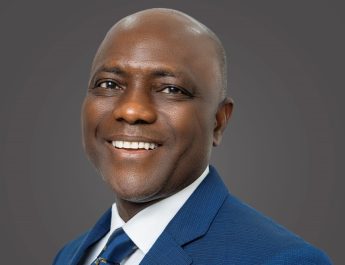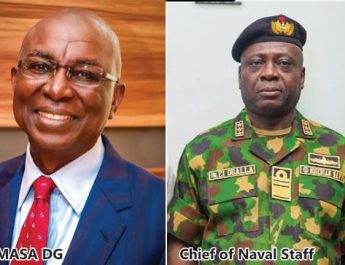At a recent breakfast meeting in Lagos, maritime business stakeholders and Federal Government agencies engaged in blame game over the decaying ports infrastructure, regulatory issues and the almost fleeting ease of doing business in the nation’s sea ports
By Innocent Chukwu
It was a time for the truth to be told. There was no-holds-barred discussions on the issues at stake that morning in the Bar Hall of Rockview Hotel, Apapa, Lagos, venue of the event.
It was a breakfast meeting organized by the Maritime Reporters Association of Nigeria (MARAN), the umbrella body of all maritime media in Lagos State. The meeting themed, “Rehabilitation of the Tincan Island Port: Proffering Workable Solution”, was to focus mainly on the deplorable state of the Tincan Island Port Infrastructure, especially as it affects the dilapidating and decaying quay aprons at the port.
But the discussions were to trigger other equally important issues that were to compel maritime stakeholders and heads of government agencies in the sector to engage in hot debates while trying to proffer solutions to the maladies that have retarded advancement of the sector for many years.
Some of the burning issues include business regulations in the sector, excessive charges by government agencies and dollarization of charges, decongestion of Lagos ports and ease of doing business in the ports referred to as port efficiency.
Present at the event which took place on Thursday, July 6, 2023 were the Managing Director of the Nigerian Ports Authority (NPA represented), a former Director General of the Nigerian Maritime Administration and Safety Agency (NIMASA), Temisan Omatseye, President General of the Maritime Workers Union of Nigeria (MWUN), Comrade Adeyanju, the Executive Secretary/Chief Executive Officer (ES/CEO) of Nigerian Shippers Council, Mr Emmanuel Jime and President, Barge Owners Association of Nigeria (BOAN), Bumi Olumekun.
Others were the Chairman of the Board of Nigerian Indigenous Ship-owners Association of Nigeria (NISA), Isaac Jolapamo, former president of the Association of Government Approved Freight Forwarders (NAGAFF), Eugene Nweke and Godfrey Bivbiere, President of MARAN which hosted the event. In his keynote address, Bivbiere, MARAN president decried the involvement of “politicians in almost all financial expenditures in the industry which makes it often difficult for things to be done correctly”, especially as it concerned procurement processes. However, Bivbiere noted that “It is our sincere desire that at the end of this breakfast meeting there will be workable solutions to the tragedy of our failed quay aprons at the Tincan Port as well as other similar challenges confronting port operations in the country”.
The managing director of the NPA, Mohammed Bello Koko who was represented by Ayo Durowaye, a general manager in the office of the managing director, said infrastructure decay is not only happening at the Tincan Island Port alone but at other ports in the country. He noted that the port was established since 1977, hence it was not a surprise that its infrastructures have begun to dilapidate. He said that the Federal Government was aware of the Tincan Island Port present condition.
Durowaye said that the “Tincan Port quay aprons reconstruction is uppermost in the agenda of the Nigerian Ports Authority. We’re doing something about it. We have had discussions with some strong organisations on how they can help us drive the renewal and rehabilitation of the Tincan Port”.
The NPA top manager said large vessels, including the MS Marine berthed at the Tincan Port last May. He insisted that “Tincan Port is bad but at the same time it’s able to accommodate vessels. Yes, we have infrastructural issues at Tincan Port but it has not come to the extent where vessels are avoiding the port. The biggest vessel berthed at the PTML Port recently
“NPA is not resting, we’ve taken steps to develop port infrastructures across the country but now Tincan Port is our focus. Sixty to 70 percent of imports into the country come through Apapa and Tincan ports, so the situation is not that too bad.
“NPA is working out funding for port infrastructures development but there’s no timeline for it”. In his own address, Omatseye, former Director General of NIMASA said, “Lekki Port will face the same thing Apapa and Tincan Ports are facing. There will be demurrage which will increase the price of goods. Lekki Port should not be open so that goods will move to Koko Port, Warri Port and Calabar Port. These ports are not doing anything””.
Jolapamo Chair of NISA identified that “Maritime development has three areas. The first is port development. We have ports but because we are not running them seriously, that is why this meeting is called by MARAN which is why we’re here today. We also need to train seafarers, we’re doing it but we’re not doing it the best way that other people are doing it, that’s why we’re not getting results”.
At the middle of the event, the disclosure that NPA collects charges from Barge operators in dollars was to draw the ire of Emmanuel Jime, the Nigerian Shippers Council boss who retorted immediately that “Charging Barge operators in dollars is illegal, when I get back to office I’ll look into it”.
Mr Nura Musa Wagani, the Director of Operations and Enforcement, Barge Operators Association of Nigeria (BOAN), had complained that NPA which licensed them to operate was collecting exorbitant charges in dollars which was affecting their business and employees negatively.
“Our regulators are the ones that licensed us as barge operators. We operate on the inland waterways. How can we, as Nigerians, operating in Nigeria with naira, and our regulator is charging us in dollars? We’re dying gradually, to barge one empty container, it is costing us N265,000, what about the laden ones?
“The tariff regime of NPA is not sustainable because before you operate as a barge operator you must obtain a bond of N50 million “.
But the Shippers’ Council boss, Jime reacted that regulation has remained a conflict between the NPA and Shippers Council. He blamed the Federal Government, arguing that “This is one of the challenges that the legal framework has put us in a place where you give an agency power by the left hand and take it away and give another agency by the right.
“The Nigerian law which the Nigerian Shippers Council, as an economic regulator, has been mandated to implement does not recognize the denomination of charges in dollars. Where this is happening, that is completely inconsistent with the laws of this country, and I can say that authoritatively.
“The Nigerian Shippers Council has been given the mandate to regulate the providers of services. On that list, NPA is the number one service provider that the Shippers Council has been mandated to regulate “.
Putting up a defence, Durowaye, the NPA representative explained that the Authority only made provision for deposits of N50 million, N150 million and N250 million by barge operators as a prerequisite for registration to serve as a guarantee for mishaps that may arise on the part of the operators.




